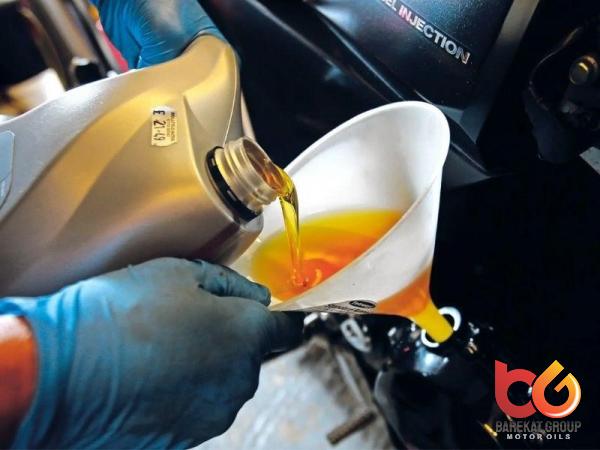A Comprehensive Guide to Understanding Different Types of Engine Oil Introduction: Engine oil is essential for the proper functioning and longevity of any vehicle. It performs a multitude of tasks, including lubricating engine components, preventing wear and tear, and removing heat and contaminants. With so many options available, it can be overwhelming to navigate through the various types of engine oil. In this article, we will explore the different kinds of engine oil, their properties, and their specific applications, helping you make an informed decision about what type of oil is best for your vehicle. 1. Conventional Oil: Conventional oil, also known as mineral oil, is derived from crude oil through a refining process. It is the most basic and traditional type of engine oil available. It offers decent lubrication and protection for engines but has relatively lower performance than more advanced options. Conventional oil is generally suitable for older vehicles operating under normal driving conditions. 2. Synthetic Oil: Synthetic oil is a man-made lubricant that is designed to provide superior performance and protection, particularly under extreme conditions. It is produced through chemical synthesis and is tailored to meet specific viscosity and performance requirements. Synthetic oils offer several benefits, such as enhanced engine cleanliness, improved fuel efficiency, and extended oil change intervals. They are recommended for high-performance engines, vehicles with turbochargers, and those exposed to extreme temperatures. 3. Synthetic Blend Oil: As the name suggests, synthetic blend oil is a blend of both conventional and synthetic oils.
Engine oil
 It combines the benefits of both types, offering improved performance and affordability. Synthetic blend oil provides better protection against engine wear and deposits compared to conventional oil, making it a suitable choice for moderate to severe driving conditions and for vehicles that require extra protection. 4. High Mileage Oil: High mileage oil is specifically formulated for vehicles with over 75,000 miles on the odometer. It contains additional additives that help to condition and rejuvenate engine seals, preventing leaks and reducing oil consumption. High mileage oil can also minimize friction and wear in older engines, promoting better overall performance and reliability. 5. Racing Oil: Racing oil is designed for high-performance engines that are subjected to extreme conditions, such as racing or intense track use. It offers excellent lubrication and cooling properties, reduces friction, and enhances engine performance. Racing oil has a high viscosity index and is often formulated to withstand sustained high temperatures and heavy loads. 6. Diesel Engine Oil: Diesel engines have distinct requirements when it comes to engine oil. Diesel engine oil needs to handle higher temperatures, higher compression ratios, and the presence of soot and contaminants. Therefore, diesel engine oils typically have higher viscosity and contain additives to control soot and reduce wear. There are specific categories of diesel engine oils available, such as CK-4, CJ-4, and CI-4, which match the needs of different types of diesel engines. 7. Natural Gas Engine Oil: With the increasing popularity of natural gas as an alternative fuel, specific engine oil formulations have been developed to cater to natural gas engines. These oils have unique properties to handle the challenges associated with natural gas, such as a cleaner combustion process and higher combustion temperatures. The lubricants must be able to handle gas contamination and provide excellent protection against wear and corrosion. 8. Electric Vehicle (EV) Lubricants: Electric vehicles are growing in popularity, and while they do not have traditional internal combustion engines, they still require lubrication for components such as gears and bearings. Electric vehicle lubricants are formulated to reduce friction and provide excellent thermal stability. As EV technology evolves, lubricants specifically designed for electric vehicle applications are likely to become more specialized.
It combines the benefits of both types, offering improved performance and affordability. Synthetic blend oil provides better protection against engine wear and deposits compared to conventional oil, making it a suitable choice for moderate to severe driving conditions and for vehicles that require extra protection. 4. High Mileage Oil: High mileage oil is specifically formulated for vehicles with over 75,000 miles on the odometer. It contains additional additives that help to condition and rejuvenate engine seals, preventing leaks and reducing oil consumption. High mileage oil can also minimize friction and wear in older engines, promoting better overall performance and reliability. 5. Racing Oil: Racing oil is designed for high-performance engines that are subjected to extreme conditions, such as racing or intense track use. It offers excellent lubrication and cooling properties, reduces friction, and enhances engine performance. Racing oil has a high viscosity index and is often formulated to withstand sustained high temperatures and heavy loads. 6. Diesel Engine Oil: Diesel engines have distinct requirements when it comes to engine oil. Diesel engine oil needs to handle higher temperatures, higher compression ratios, and the presence of soot and contaminants. Therefore, diesel engine oils typically have higher viscosity and contain additives to control soot and reduce wear. There are specific categories of diesel engine oils available, such as CK-4, CJ-4, and CI-4, which match the needs of different types of diesel engines. 7. Natural Gas Engine Oil: With the increasing popularity of natural gas as an alternative fuel, specific engine oil formulations have been developed to cater to natural gas engines. These oils have unique properties to handle the challenges associated with natural gas, such as a cleaner combustion process and higher combustion temperatures. The lubricants must be able to handle gas contamination and provide excellent protection against wear and corrosion. 8. Electric Vehicle (EV) Lubricants: Electric vehicles are growing in popularity, and while they do not have traditional internal combustion engines, they still require lubrication for components such as gears and bearings. Electric vehicle lubricants are formulated to reduce friction and provide excellent thermal stability. As EV technology evolves, lubricants specifically designed for electric vehicle applications are likely to become more specialized.
Specifications of Engine oil
 Conclusion: Choosing the right engine oil is crucial for maintaining the longevity and performance of your vehicle. The different types of engine oil available cater to the diverse requirements of various engines, driving conditions, and vehicle types. Conventional oil is suitable for standard driving conditions, while synthetic oils offer higher performance and protection. Synthetic blend oil strikes a balance between cost and performance. High mileage oil caters to older vehicles, racing oil is ideal for race track usage, and diesel engine oils are formulated for diesel engines’ specific needs. Finally, natural gas engine oil and lubricants for electric vehicles cater to the unique demands of these alternative fuel technologies. By understanding the differences between these types of engine oil, you can make an informed decision and ensure the optimal performance and longevity of your vehicle’s engine.Types of Engine Oil: A Detailed Analysis 1. Conventional Oil: Conventional oil, also known as mineral oil, is the most basic and widely used type of engine oil. It is derived from crude oil through a refining process. Conventional oil contains a blend of base oils and additives that provide lubrication and protection for the engine. While it is affordable and readily available, conventional oil has certain limitations. It tends to break down at high temperatures and offers lower viscosity stability compared to synthetic oils. Conventional oil is best suited for older vehicles with less demanding driving conditions. 2. Synthetic Oil: Synthetic oil is an advanced lubricant that offers superior performance and protection for modern engines. It is chemically synthesized to create a uniform molecular structure, resulting in better stability, enhanced viscosity performance, and superior resistance to breakdown at high temperatures. Synthetic oil provides excellent lubrication under extreme conditions, such as high loads, high temperatures, and cold starts. It also offers better resistance to oxidation, reducing the formation of sludge and deposits in the engine. Synthetic oil is highly recommended for high-performance vehicles, turbocharged engines, and those operating in extreme climates. 3. Synthetic Blend Oil: Synthetic blend oil, also known as semi-synthetic oil, is a mixture of conventional and synthetic oils. It offers a balance between performance and affordability. Synthetic blend oil contains a higher percentage of synthetic oil compared to conventional oil, providing better protection and performance characteristics. It offers improved resistance to oxidation, better high-temperature stability, and enhanced protection against wear and deposits. Synthetic blend oil is suitable for vehicles that require extra protection or operate under moderate to severe driving conditions.
Conclusion: Choosing the right engine oil is crucial for maintaining the longevity and performance of your vehicle. The different types of engine oil available cater to the diverse requirements of various engines, driving conditions, and vehicle types. Conventional oil is suitable for standard driving conditions, while synthetic oils offer higher performance and protection. Synthetic blend oil strikes a balance between cost and performance. High mileage oil caters to older vehicles, racing oil is ideal for race track usage, and diesel engine oils are formulated for diesel engines’ specific needs. Finally, natural gas engine oil and lubricants for electric vehicles cater to the unique demands of these alternative fuel technologies. By understanding the differences between these types of engine oil, you can make an informed decision and ensure the optimal performance and longevity of your vehicle’s engine.Types of Engine Oil: A Detailed Analysis 1. Conventional Oil: Conventional oil, also known as mineral oil, is the most basic and widely used type of engine oil. It is derived from crude oil through a refining process. Conventional oil contains a blend of base oils and additives that provide lubrication and protection for the engine. While it is affordable and readily available, conventional oil has certain limitations. It tends to break down at high temperatures and offers lower viscosity stability compared to synthetic oils. Conventional oil is best suited for older vehicles with less demanding driving conditions. 2. Synthetic Oil: Synthetic oil is an advanced lubricant that offers superior performance and protection for modern engines. It is chemically synthesized to create a uniform molecular structure, resulting in better stability, enhanced viscosity performance, and superior resistance to breakdown at high temperatures. Synthetic oil provides excellent lubrication under extreme conditions, such as high loads, high temperatures, and cold starts. It also offers better resistance to oxidation, reducing the formation of sludge and deposits in the engine. Synthetic oil is highly recommended for high-performance vehicles, turbocharged engines, and those operating in extreme climates. 3. Synthetic Blend Oil: Synthetic blend oil, also known as semi-synthetic oil, is a mixture of conventional and synthetic oils. It offers a balance between performance and affordability. Synthetic blend oil contains a higher percentage of synthetic oil compared to conventional oil, providing better protection and performance characteristics. It offers improved resistance to oxidation, better high-temperature stability, and enhanced protection against wear and deposits. Synthetic blend oil is suitable for vehicles that require extra protection or operate under moderate to severe driving conditions.
Buy Engine oil
 4. High Mileage Oil: High mileage oil is specifically designed for vehicles with over 75,000 miles on the odometer. As engines age, they may experience issues such as increased oil consumption, leaks from seals, and wear on internal components. High mileage oil contains additives that help condition and protect the engine’s seals, minimizing leaks and reducing oil consumption. It also includes additives that reduce friction and minimize wear on older engine components. High mileage oil provides better protection for older engines and can help extend their life span. 5. Racing Oil: Racing oil is specifically formulated for high-performance engines used in racing or intense track conditions. Racing engines operate at much higher temperatures and RPMs than regular engines, putting more stress on the oil. Racing oil is designed to provide excellent lubrication and cooling properties under these extreme conditions. It has a high viscosity index, meaning it maintains its viscosity and film strength even under extreme heat and pressure. Racing oil also contains additives that reduce friction and wear, enhancing engine performance and reliability on the race track. 6. Diesel Engine Oil: Diesel engines have different requirements when it comes to engine oil due to their higher compression ratios, higher temperatures, and the presence of soot and contaminants. Diesel engine oil needs to handle these challenges effectively to ensure proper engine protection and performance. Diesel engine oils are formulated with higher viscosity levels and contain additives that control soot and minimize wear. There are specific categories of diesel engine oils available, such as CK-4, CJ-4, and CI-4, which are designed to match the needs of different types of diesel engines. 7. Natural Gas Engine Oil: With the increasing use of natural gas as an alternative fuel, specific engine oil formulations have been developed to cater to natural gas engines. Natural gas engines have unique requirements due to the cleaner combustion process and higher combustion temperatures. Natural gas engine oils are designed to handle gas contamination and provide excellent protection against wear and corrosion.
4. High Mileage Oil: High mileage oil is specifically designed for vehicles with over 75,000 miles on the odometer. As engines age, they may experience issues such as increased oil consumption, leaks from seals, and wear on internal components. High mileage oil contains additives that help condition and protect the engine’s seals, minimizing leaks and reducing oil consumption. It also includes additives that reduce friction and minimize wear on older engine components. High mileage oil provides better protection for older engines and can help extend their life span. 5. Racing Oil: Racing oil is specifically formulated for high-performance engines used in racing or intense track conditions. Racing engines operate at much higher temperatures and RPMs than regular engines, putting more stress on the oil. Racing oil is designed to provide excellent lubrication and cooling properties under these extreme conditions. It has a high viscosity index, meaning it maintains its viscosity and film strength even under extreme heat and pressure. Racing oil also contains additives that reduce friction and wear, enhancing engine performance and reliability on the race track. 6. Diesel Engine Oil: Diesel engines have different requirements when it comes to engine oil due to their higher compression ratios, higher temperatures, and the presence of soot and contaminants. Diesel engine oil needs to handle these challenges effectively to ensure proper engine protection and performance. Diesel engine oils are formulated with higher viscosity levels and contain additives that control soot and minimize wear. There are specific categories of diesel engine oils available, such as CK-4, CJ-4, and CI-4, which are designed to match the needs of different types of diesel engines. 7. Natural Gas Engine Oil: With the increasing use of natural gas as an alternative fuel, specific engine oil formulations have been developed to cater to natural gas engines. Natural gas engines have unique requirements due to the cleaner combustion process and higher combustion temperatures. Natural gas engine oils are designed to handle gas contamination and provide excellent protection against wear and corrosion.
Engine oil + buy and sell
 They have specific additive packages to ensure proper lubrication and reduce the formation of deposits caused by natural gas combustion. 8. Electric Vehicle (EV) Lubricants: Electric vehicles (EVs) are becoming more popular, and while they do not have traditional internal combustion engines, they still require lubrication for components such as gears and bearings. EV lubricants are formulated to reduce friction and provide excellent thermal stability. They are designed to work in conjunction with the unique requirements of electric vehicle drivetrains, which have different operating conditions than conventional engines. EV lubricants help minimize energy loss, ensure smooth operation of components, and maintain overall efficiency. 9. Bio-Based Engine Oil: Bio-based engine oil is an environmentally friendly alternative to petroleum-based oils. It is derived from renewable resources such as plant oils and animal fats. Bio-based oils offer similar performance characteristics to conventional oils in terms of lubrication, cooling, and protection. They are also biodegradable and less harmful to the environment. Bio-based engine oils are gaining popularity as automotive companies and consumers strive for more sustainable solutions. However, it’s important to note that bio-based oils may have limitations in certain applications and may not be suitable for all engines. 10. Specialized Engine Oils: In addition to the aforementioned types, there are various specialized engine oils available for specific applications. Some examples include: – Motorcycle Oil: Motorcycle engines have different requirements than automotive engines, and specialized motorcycle oils are formulated to meet those needs, such as wet clutch compatibility and specific heat dissipation properties. – Marine Oil: Marine engines operate in harsh conditions, including high moisture and saltwater exposure. Marine oils are formulated to provide excellent protection against corrosion, water intrusion, and increased lubrication needs in marine environments. – Two-Stroke Oil: Two-stroke engines, commonly found in small power tools and recreational vehicles, require oil to be mixed with the fuel for lubrication. Two-stroke oils are designed to burn cleanly and provide optimal lubrication for these engines. – Vintage and Classic Car Oil: Older or vintage cars may require specialized oils to match the needs of their engines, which may have unique tolerances and operating conditions. Conclusion: Choosing the right type of engine oil is crucial for maintaining the performance, longevity, and reliability of your vehicle’s engine. By understanding the different types of engine oil available, their properties, and their specific applications, you can make an informed decision about the best oil for your vehicle. Whether it’s conventional oil for older vehicles, synthetic oil for high-performa
They have specific additive packages to ensure proper lubrication and reduce the formation of deposits caused by natural gas combustion. 8. Electric Vehicle (EV) Lubricants: Electric vehicles (EVs) are becoming more popular, and while they do not have traditional internal combustion engines, they still require lubrication for components such as gears and bearings. EV lubricants are formulated to reduce friction and provide excellent thermal stability. They are designed to work in conjunction with the unique requirements of electric vehicle drivetrains, which have different operating conditions than conventional engines. EV lubricants help minimize energy loss, ensure smooth operation of components, and maintain overall efficiency. 9. Bio-Based Engine Oil: Bio-based engine oil is an environmentally friendly alternative to petroleum-based oils. It is derived from renewable resources such as plant oils and animal fats. Bio-based oils offer similar performance characteristics to conventional oils in terms of lubrication, cooling, and protection. They are also biodegradable and less harmful to the environment. Bio-based engine oils are gaining popularity as automotive companies and consumers strive for more sustainable solutions. However, it’s important to note that bio-based oils may have limitations in certain applications and may not be suitable for all engines. 10. Specialized Engine Oils: In addition to the aforementioned types, there are various specialized engine oils available for specific applications. Some examples include: – Motorcycle Oil: Motorcycle engines have different requirements than automotive engines, and specialized motorcycle oils are formulated to meet those needs, such as wet clutch compatibility and specific heat dissipation properties. – Marine Oil: Marine engines operate in harsh conditions, including high moisture and saltwater exposure. Marine oils are formulated to provide excellent protection against corrosion, water intrusion, and increased lubrication needs in marine environments. – Two-Stroke Oil: Two-stroke engines, commonly found in small power tools and recreational vehicles, require oil to be mixed with the fuel for lubrication. Two-stroke oils are designed to burn cleanly and provide optimal lubrication for these engines. – Vintage and Classic Car Oil: Older or vintage cars may require specialized oils to match the needs of their engines, which may have unique tolerances and operating conditions. Conclusion: Choosing the right type of engine oil is crucial for maintaining the performance, longevity, and reliability of your vehicle’s engine. By understanding the different types of engine oil available, their properties, and their specific applications, you can make an informed decision about the best oil for your vehicle. Whether it’s conventional oil for older vehicles, synthetic oil for high-performa
Your comment submitted.